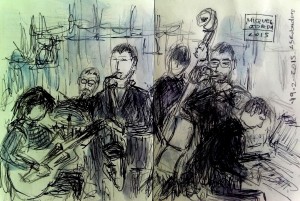Ramon Prats (drums)
Àlex Reviriego (bass)
Tom Chant (tenor and soprano saxes)
Dani Comas (guitar)
Pope (trumpet, flugelhorn)
Marco Mezquida (piano)
Here’s a random thought: can we apply the principle of Darwinian natural selection (that stronger, more survival-oriented genes and traits are more likely to survive and therefore dominate the gene pool/species) to improvised music? In other words, in that initial primordial chaotic sound-soup, is it the stronger, more ‘fit’ notes, riffs, motifs, lines, melodies, what-have-you that are more likely to be picked up, mutated, repeated…? And if so, what constitutes “strong” – not volume, necessarily. The short answer is probably, who knows and possibly, who cares. But at the very least, it’s an indicator of where my head can go when exposed to the alchemical and creative interactions to be found at Robadors 23.
The ‘soup’ started out slow and easy this week: squeaks and exhalations from Chant, similarly minimalist breathings from Pope, simple rhythmic tapping of the guitar’s body by Comas, muted slapping of a drumhead by Prats… Evolution is inevitable and the sound of a piano is heard from Mezquida, one hand on the keys, the other muting the exposed wires; the percussion ebbs and flows; and finally Reviriego’s bowing adds atmosphere and just a little tension. From this mixture of individually gentle sounds comes a huge swell, pushing at the audience. An audio cloud from which horns stab outwards, the bass rumbles, piano strings shimmer… All highly enjoyable but there’s a sense that this sextet is still taxi-ing for takeoff.
…which is not long in coming, happily. Suddenly, it’s all brass squalling, hammering drumsticks, a shifting tapestry of piano chords, and the engine: Reviriego’s bass pushing and surging, and providing a buoyancy to all… and underneath it all, barely-audible textural additions from Comas’ Fender Jazzmaster before a shift to thicker chording and single distinct notes.
As ever, Miquel Jordà‘s image captures something of the emerging density and restless exploration:
Tonight it’s as if each musician is adopting a series of distinct stances or modes of expression; each a distinctive puzzle piece which is then placed next to the others to see what picture might emerge. Another set of pieces: Comas plinks behind the bridge, Chant oscillates in the upper registers (sounding very Quatermass & the Pit), Reviriego marks each bar with a single note (not always on the same beat, naturally). These three elements circle and climb, urged upward by their peers, reaching apogee in a 6-way free frenzy.
The second improvisation starts so delicately, some people don’t notice and it’s a minute or two before the last audience voices are silenced. Reviriego bows some strange sounds from just below the nut; Mezquida harps it inside the piano; Chant is on one leg, seeking those alternate harmonics from the soprano muted against the other limb; Comas sprinkles grace notes deftly; Prats and Pope wait patiently. It’s all becoming quite otherworldly, an odd-yet-compelling combination of pretty and sinister with a lurking sense of untapped potential that is only enhanced when Pope begins to make the waking sounds of Great Cthulhu through his horn. A weirdly celebratory warning.
A Darwinian process? Maybe. But, if so, it seems to result in delightfully alien lifeforms…

